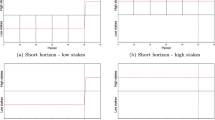Abstract
We report the results of experiments designed to test the impact of social status on learning in a coordination game. In the experiment, all subjects observe the play of an agent who either has high status or low status. In one treatment the agent is another player in the game; in the other the agent is a simulated player. Status is assigned within the experiment based on answers to a trivia quiz. The coordination game has two equilibria: one is payoff-dominant but risky, and the other is risk-dominant. The latter is most commonly chosen in experiments where there is no coordination device. We find that a commonly observed agent enhances coordination on the payoff-dominant equilibrium more often when the agent has high status.
Similar content being viewed by others
References
Anderson, S. P., Goeree, J. K., & Holt, C. A. (2001). Minimum-effort coordination games: stochastic potential and logit equilibrium. Games and Economic Behavior, 34(2), 177–199.
Anderson, S. P., Goeree, J. K., & Holt, C. A. (2002). The logit equilibrium: a perspective on intuitive behavioral anomalies. Southern Economic Journal, 69(1), 21–47.
Bala, V., & Goyal, S. (1998). Learning from neighbors. Review of Economic Studies, 65, 595–621.
Ball, S. B., & Eckel, C. (1996). Buying status: experimental evidence on status in negotiation. Psychology and Marketing, 13(4), 381–405.
Ball, S. B., & Eckel, C. (1998). The economic value of status. Journal of Socio-Economics, XXVII, 495–514.
Ball, S. B., Eckel, C., Grossman, P., & Zame, W. (2001). Status in markets. The Quarterly Journal of Economics, 116(1), 161–188.
Becker, G. S. (1971). The economics of discrimination (2nd ed.). Chicago: University of Chicago Press.
Becker, G. S. (1974). A theory of social interactions. Journal of Political Economy, LXXXII, 1063–1093.
Brandts, J., & MacLeod, W. B. (1995). Equilibrium selection in experimental games with recommended play. Games and Economic Behavior, 11, 36–63.
Brown, P. M. (1994). Learning from experience, reference points, and decision costs. Journal of Economic Behavior and Organization, 27, 381–399.
Camerer, C., & Ho, T.-H. (1999). Experience-weighted attraction learning in normal form games. Econometrica, 67, 827–874.
Cooper, R. W., DeJong, D. V., Forsythe, R., & Ross, T. W. (1990). Selection criteria in coordination games: some experimental results. American Economic Review, 80, 218–233.
Duffy, J., & Kornienko, T. (2005). Does competition affect giving? An experimental study (Working Paper). Department of Economics, University of Pittsburgh.
Eckel, C., & Wilson, R. (2000). Social learning in a social hierarchy: an experimental study. American Association for the Advancement of Science. Convention in Washington, D.C., 16–22 February.
Gil-White, F., & Henrich, J. (2001). The evolution of prestige: freely conferred deference as a mechanism for enhancing the benefits of cultural transmission. Evolution and Human Behavior, 22, 165–196.
Kumru, C., & Vesterlund, L. (2005). The effect of status on voluntary contribution (Working Paper). Department of Economics, University of Pittsburgh.
McKelvey, R. D., & Palfrey, T. R. (1995). Quantal response equilibria in normal form games. Games and Economic Behavior, 7, 6–38.
Ochs, J. (1995). Coordination problems. In J. Kagel & A. Roth (Eds.), Handbook of experimental economics (pp. 195–251). Princeton: Princeton University Press.
Offerman, T., & Sonnemans, J. (1998). Learning and experience by imitating successful others. Journal of Economic Behavior and Organization, 34, 559–575.
Richerson, P. J., & Boyd, R. (2004). Not by genes alone: how culture transformed human evolution. Chicago: University of Chicago Press.
Roth, A. E., & Erev, I. (1998). Predicting how people play games: reinforcement learning in experimental games with unique, mixed-strategy equilibria. American Economic Review, 88, 848–881.
Schelling, T. (1960). The strategy of conflict. Cambridge: Harvard University Press.
Schotter, A., & Sopher, B. (2003). Social learning and coordination conventions in intergenerational games: an experimental study. Journal of Political Economy, 111, 498–529.
Van Huyck, J. B., Battalio, R. C., & Beil, R. (1990). Tacit coordination games, strategic uncertainty, and coordination failure. American Economic Review, 80, 234–248.
Van Huyck, J. B., Battalio, R. C., & Beil, R. (1991). Strategic uncertainty, equilibrium selection principles, and coordination failure. Quarterly Journal of Economics, 106, 885–911.
Van Huyck, J. B., Battalio, R. C., & Rankin, F. W. (1997). On the origin of convention: evidence from coordination games. Economic Journal, 107, 576–596.
Webster, M., & Foschi, M. (1988). Overview of status generalization, In: M. Webster & M. Foschi (Eds.), Status generalization: new theory and research. Stanford: Stanford University Press. Chap. 1.
Author information
Authors and Affiliations
Corresponding author
Rights and permissions
About this article
Cite this article
Eckel, C.C., Wilson, R.K. Social learning in coordination games: does status matter?. Exp Econ 10, 317–329 (2007). https://doi.org/10.1007/s10683-007-9185-x
Published:
Issue Date:
DOI: https://doi.org/10.1007/s10683-007-9185-x




